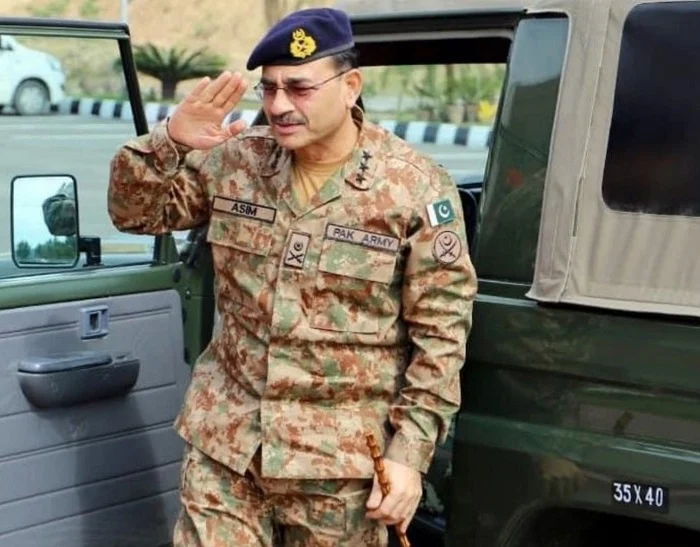The exit of General Qamar Javed Bajwa and the entry of Asim Munir as the new Chief of Army Staff (COAS), has opened another chapter in Pakistan’s turbulent politics.
The exit of Gen. Bajwa has ended the verbal attacks on the military by former Prime Minister Imran Khan and senior members of his Pakistan Tehreek-e-Insaf party. With the baton handed over to the rather non-controversial Gen. Munir, the Pak military has got a breather to recover from Khan’s onslaught. Besides, Khan’s Long March, which had given the former Prime Minister the opportunity to press home his attack on the “establishment” has also fizzled out. This has opened a pathway for the two Sharif—Nawaz and Shehbaz—to re-strategize.
@NawazSharifMNS@CMShehbaz@MaryamNSharif@HamzaSS
پاکستان میں موٹرویز کی بنیادیں میاں نواز شریف نے رکھیں👇
میاں شہباز شریف pic.twitter.com/EZdFhVqEJn— Mian Zahid Abbas (@MianZahidAbbas) December 14, 2022
Clearly, there are two vectors that will determine whether Pakistan can break from the tumult of recent months which began on April 10 with the unseating of Khan in a no-confidence motion, and the formation of a new coalition led by Prime Minister Shehbaz Sharif. Foremost is the marginalisation of the mercurial Imran Khan, tuned with the successful return to power of former Prime Minister Nawaz Sharif. The project can successfully conclude with the formation of a new government steered by Sharif.
Already, there is considerable speculation that the senior Sharif could return from self-exile in London to Pakistan next month. “We have kicked off work on arrangements from today. Workers from every union council will come to greet the party president holding banners with Nawaz Sharif’s name inscribed on them,” said interior minister Rana Sanaullah during a December 9 press conference.
But Sharif’s comeback will have a positive impact only if four key issues are successfully addressed so that the senior Sharif is propelled to a leadership position once again.
First, the civil-military relations damaged by Khan’s blistering attack against former COAS Bajwa and the ISI–the Pakistani intelligence agency–have to be rebooted. This is already a work in progress. On Saturday, Rana Sanaullah, the interior minister asserted that those within the PTI camp who have abused state institutions including the army and the judiciary will be firmly docked.
He specifically mentioned the case of Senator Azam Swati of the PTI, who is under arrest. He stressed that Swati had targeted two key institutions—the army and the judiciary. It is obvious that concrete steps are being taken by the Shehbaz Sharif administration to restore the army’s status as a holy cow, which is beyond reproach.
Azam Swati, a senator for Pakistan Tehreek-e-Insaf, was accused of targeting two institutions rather than the government, according to Rana Sanauallah, who dismissed notion on Saturday.#pronews #news #RanaSanaullah #PTI #Pakistan #AzamSwati #goverment #politics #InteriorMinister pic.twitter.com/OJTUl9pJuU
— Pro News (@pronews_com_pk) December 10, 2022
Second, Pakistan Democratic Movement (PDM), the ruling coalition led by Shehbaz Sharif, has to shed the corruption tag that Khan has, with some success, slapped on the Sharifs and the Zardaris. The PDM has launched a counter-campaign, which has so far yielded feeble results, by labelling Khan as corrupt. There is, however, a slim chance that the initiative can be seized in case the former premier is convicted of having personally benefited by selling gifts presented by foreign leaders in the so-called Toshkhana case.
Court reserves verdict in Imran Khan’s Toshkhana case https://t.co/SU4aAawY9S pic.twitter.com/vRYeGFqJhV
— GNN (@gnnhdofficial) December 12, 2022
Third, project Sharif can succeed only if the fault lines in the Imran Khan camp are broadened, and breakaway factions support Sharif. Specifically, the PDM would like to chip away influencers with the Pakistan Muslim League (Quaid), which has deep divisions, and has not been entirely united in backing PTI. Efforts are on to address three pivots inside the PML (Q)—Punjab Chief Minister Chaudhry Pervez Elahi, his son Moonis Elahi who appears to be most strongly committed to Khan, and Chaudhry Shujaat Hussain, Pervez Elahi’s brother. There are reports that Chaudhary Shujaat has Nawaz Sharif’s backing in the formation of a new government in Punjab in future, in return for support for an anti-PTI alliance.
Pakistan Muslim League-Quaid (PML-Q) chief Chaudhry Shujaat Hussain Wednesday proposed to become a mediator between the Pakistan Tehreek-e-Insaf (PTI) and the Pakistan Democratic Movement (PDM)-led coalition government.#PTI #PMLQ #PMLN pic.twitter.com/UH2eMZo8Ey
— Pakistan Observer (@pakobserver) December 8, 2022
Fourth, in tune with a counter-campaign against Khan, a positive agenda of hope and development has to be generated to woo a sceptical electorate, which generally holds a dim view of the country’s political class.
Nevertheless, it will not be easy for the military and the Sharifs to build a dominant counter-narrative against Khan as the time to do so is short. Sooner than later fresh elections will have to be called out next year, giving insufficient time to wreck Khan’s appeal as a white knight in shining armour who single-handedly is taking on a vile and corrupt system. Expect an open season of muckraking, and pivotal events on the ground in the days and months ahead.




















